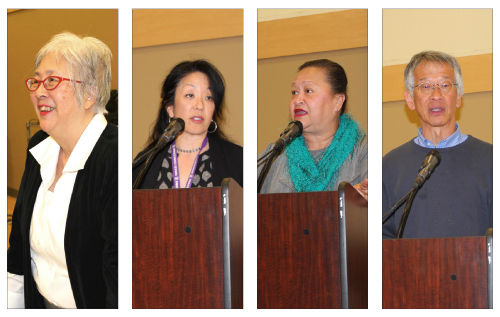By James Tabafunda
Northwest Asian Weekly

From left: Asian Pacific Islander Coalition (APIC) Co-chair and Asian Counseling Referral Service Executive Director Diane Narasaki at an APIC community briefing Jan. 21, Keiro Northwest Chief Operating Officer Janice Deguchi at an APIC community briefing Jan. 21, Pierce County Asian Pacific Islander Coalition (APIC) Chair and Asia Pacific Cultural Center Executive Director Lua Pritchard at an APIC community briefing Jan. 21, and Asian Pacific Islander Coalition (APIC) Co-chair and Equity in Education Coalition Board President/Co-founder Tony Lee at an APIC community briefing Jan. 21 (Photos by James Tabafunda/NWAW)
With the general election set for Nov. 8, Asian and Pacific Islander American (APIA) leaders join presidential candidates in making sure key issues are brought up for public debate.
There are 11 specific community programs and services the Asian Pacific Islander Coalition (APIC) has identified as being of critical importance to APIAs, especially newly arrived immigrants and refugees.
It held a King County community briefing on Jan. 21 at Asian Counseling and Referral Service (ACRS).
APIC Co-chair and ACRS Executive Director Diane Narasaki said the event would cover a legislative agenda, as well as scheduled events for 2016, and then welcomed the diverse group of community members.
“It’s a really important year for us to make sure that our community is informed and ready to go, whether it’s becoming naturalized for those who aren’t yet citizens or for those who are citizens and are eligible to vote but haven’t yet registered to vote,” she said.
A video of a speech given by Mee Moua, the first Hmong American woman elected to the Minnesota Legislature in 2002 followed. She is currently the president and executive director of Asian Americans Advancing Justice in Washington, D.C.
Moua shared her experiences after arriving in the United States as a 9-year-old with her family in 1978.
At a rally against anti-Muslim rhetoric, she said, “Too often, I’ve had to hose down racial slurs that were written on our driveway and garage door, sometimes with mud, but many times with urine and feces. We were targeted because our neighbors saw us as American enemies from Vietnam.”
“I call on each and every one of us to make our voices heard, so we can shut down this ugly rhetoric and insure that we are all equal and protected and respected Americans.”
For the last 20 years, APIC has organized its annual Asian Pacific American (APA) Legislative Day for community residents to gather in Olympia and meet with the governor and state legislators. This year’s APA Legislative Day will be different.
“We are bringing a leadership delegation, and the reason is because we are saving our thousands of community members for a statewide civic engagement event [on] Sept. 15 in the Tacoma Dome,” Narasaki said.
Until then, she urged the APIA community to call the legislative hotline (1-800-562-6000) on APA Legislative Day, Jan. 26, and said, “Even if you’re not going with us physically, you can still contact our legislators and our governor to let them know whether you support the legislative agenda and support specific issues that are especially important to you.”
“And if you don’t know who your legislator is, that’s OK. You can still call that number and ask them, and they’ll tell you and you can leave a message for your legislators on that important topic.”
APIC Co-chair Tony Lee began the discussion of the legislative agenda by pointing out a paragraph in the APA Legislative Day 2016 Statement of Principles, which commends Governor Inslee’s recent statement about welcoming refugees fleeing such war-torn countries as Syria.
Lua Pritchard, chair of the Pierce County APIC, followed Lee and rallied support for a $1.5 million Asia Pacific Cultural Center. She said 100 out of the center’s 200 housing units would be for APIA senior and low-income residents and that the center would “represent all of us.”
“Each of our countries would have [its] own suite, 600-square-feet of your own country,” she said about the center’s 47 cultural suites. “We’re modeling it after the Polynesian Cultural Center in Hawaii.”
Some of the other issues in the legislative agenda include climate change, the achievement gap in education, naturalization services, dental coverage for elderly and disabled adults, and continued funding for the Washington Telephone Assistance Program.
Janice Deguchi, Keiro Northwest chief operating officer, talked about the issue of nursing home acuity, which would impose monetary penalties on nursing homes that allow people with Alzheimer’s disease, persistent mental illness, and dementia to remain in or be admitted into its resident mix.
She said, “The problem with that is that sometimes, when these patients are discharged, they really are needy (of skilled nursing care from a clinical perspective).”
Another issue in the legislative agenda is voter registration. Lee pointed out that in most countries, a voter can register on the same day he or she votes so “the more you shorten it (from 29 days in advance in Washington state to 11), you’ll have more people voting.”
A brief question-and-answer session ended the event.
“As we know, our vote is our voice,” Narasaki said. (end)
For more information about the Asian Pacific Islander Coalition, visit apicwa.org.
James Tabafunda can be reached at info@nwasianweekly.com.



